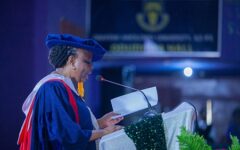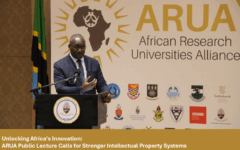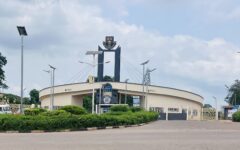OAU TEAM develops Low-Cost IoT-Compliant Weather Stations as part of Nigerian Communications Commission (NCC) Telecommunications-based Research Innovations from Academics in Nigerian Tertiary Institutions (TRIANTI) Project
June 9, 2023 2023-06-09 9:10OAU TEAM develops Low-Cost IoT-Compliant Weather Stations as part of Nigerian Communications Commission (NCC) Telecommunications-based Research Innovations from Academics in Nigerian Tertiary Institutions (TRIANTI) Project
OAU TEAM develops Low-Cost IoT-Compliant Weather Stations as part of Nigerian Communications Commission (NCC) Telecommunications-based Research Innovations from Academics in Nigerian Tertiary Institutions (TRIANTI) Project

An all-in-one weather station has been installed atop the Obafemi Awolowo University Secretariat Building as part of a project funded by the Nigerian Communications Commission (NCC). The project, titled “WeatherWAN: A Wide Area Network of Low-Cost IoT-Compliant Weather Stations” was one of 5 approved for funding by the NCC under the 2020 cycle of its Telecommunications-based Research Innovations from Academics in Nigerian Tertiary Institutions (TRIANTI) programme.
The goal of the project is to develop a network of low-maintenance, low-powered weather stations interconnected with IoT technologies, towards addressing the problem of Nigeria’s low weather station density. A pilot implementation of the network has been completed, with four nodes located at the University Secretariat Building, Faculty of Science Building, OAU Senior Staff Quarters, and the OAU Institute of Ecology-NIMASA weather station. A final node is being set up in the Department of Meteorology, Federal University of Technology, Akure.
Each node records atmospheric variables such as temperature, humidity, pressure, precipitation, wind speed and direction, and light intensity at a rate of 4 samples per hour, and transmits the data in real-time through LoRaWAN radios to a gateway from which the data are sent to a national database. Each node also has an integrated power supply subsystem, isolating it from the national power grid. The node installed atop the University Secretariat Building utilizes a bank of 3000 F ultracapacitors as storage elements for energy harvested using 40 W solar panels. Ultracapacitors are superior to conventional batteries because they can withstand a much larger number of charge-recharge cycles, and require far less maintenance.
The NCC’s TRIANTI programme is one of many NCC initiatives targeting R&D capacity building for the Nigerian educational system and telecommunications industry. In its 5 years of operation, the TRIANTI programme has sponsored about 20 research projects from over a dozen Nigerian university-based research groups. The OAU WeatherWAN project is being executed by members of the University’s Applied Artificial Intelligence and Robotics Research Lab, with Dr. Kayode P. Ayodele serving as the Principal Investigator. Team members include Dr. O.B. Akinwale, Dr. A.A. Ogunseye, Dr. F.B. Offiong, Dr. A.A. Olawole, Dr. A.L. Ayodele, and Eng. A.B. Adewale.
The project has also been facilitated by the OAU Institute of Ecology, through its Director, Prof. Aderonke Okoya, as well as a number of research assistants





